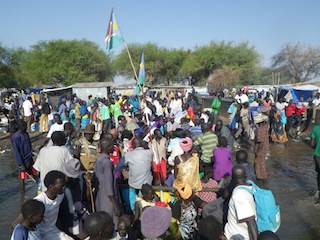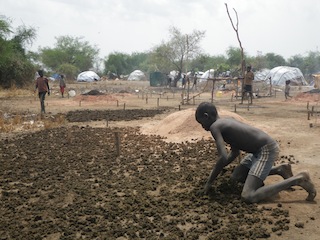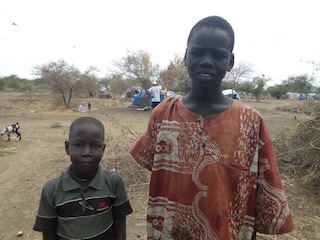Hundreds of Jonglei children forced to cross Nile to study in Lakes state
March 14, 2014 (BOR) – Hundreds of children from Twic East and Duk counties in conflict-ridden Jonglei state are crossing the White Nile by boat with their families to displaced camps in Mingkaman in Awerial county of Lakes state to access education, parents told Sudan Tribune in Bor.

Since the fighting began access to education and other key services have been interrupted or stopped completely since the fighting spread the three states of the Upper Nile region.
Peace talks between the warring factions have so far only brought a shaky ceasefire deal that both sides have violated. The Inter-governmental Authority for Development (IGAD), the East African body mediating the talks has proposed that a regional force is deployed to South Sudan to keep the two sides apart and protect ceasefire monitors.
Sudan Tribune caught up with Ayiik Aguer, a boy, 13, of primary six while crossing with his parents to from Bor to neighbouring Lakes state on Friday.

Abuk Ayiik, the boy’s mother, said the current crisis in the country was a chance to better education “if one has the ability to move up to Kenya or Uganda camps”.
Although the conflict began as the result of a political power struggle within South Sudan’s ruling party, much of the violence has been along ethnic lines between the Dinka, South Sudan’s largest ethnic group and the tribe of the president and the Nuer, whose most prominent figure is Riek Machar.
The violence especially in Bor has reopened wounds between the communities from the civil war that led to independence. In 1991 Machar split from the Southern rebels and his forces attacked Bor killing at least 2,000 local people.

Local MPs have estimated that over 2,500 people have been killed in Bor during the recent fighting, but these figures have been not yet been verified.
Ayiik lost her husband in 1992 during Machar’s last split from the SPLM/A.
“Riek Machar thought that he got a way to get rid of Dinka Bor out of this land but he was wrong. If his hatred came because of children levels of education and the number of intellectuals in this places, then more children will get access to education this time. More people from Cuei-Thon to Cuei-Keer [clans of the Dinka Bor] fled to Kenya and Uganda, after this crisis, they will come back educated. There are free schools in the refugee camps, unless one has no financial power go there like me”, she said.
Jongelei state’s relief and rehabilitation officials estimate that 50 families cross into Lakes state every day.
The majority of the residents in Bor now are those who came from Duk and Twic East Counties two weeks to avoid attacks by the rebels, which they had been anticipating. Many of these people say they will still cross to the displaced camps in Lakes state if the security situation in Jonglei remains unpredictable in the weeks to come.
There are over 70,000 displaced people in Lakes state, many of whom have come from Jonglei where 140,000 people are currently displaced according to the UN.
(ST)
100s of refugees cross into Ethiopia daily fleeing fighting in #SouthSudan. Our latest update: http://t.co/6bkd30qGHU pic.twitter.com/Dc9pnyGn7i
— UNOCHA South Sudan (@OCHASouthSudan) March 4, 2014
